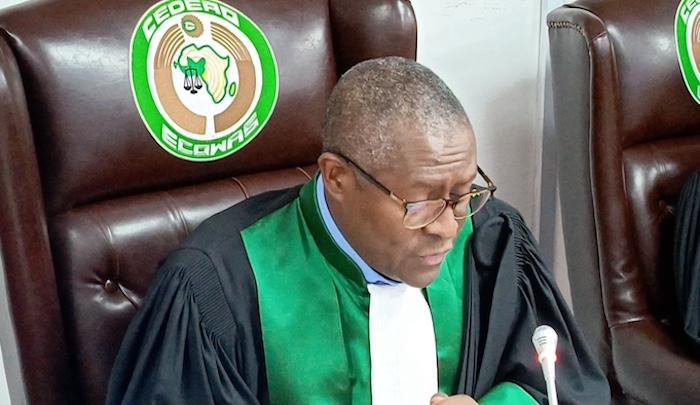The President of the ECOWAS Community Court of Justice, Hon. Justice Ricardo Cláudio Monteiro, has called on West African nations to step up their efforts in enforcing the court’s judgments, warning that the institution’s credibility and impact rely heavily on collective regional cooperation.
Justice Monteiro, who gave the charge during the closing ceremony of the first-ever Meeting of Competent National Authorities on enforcement of the Court’s decisions, lamented the low rate of compliance with the Court’s rulings despite their binding nature under Article 15(4) of the ECOWAS Revised Treaty.
The two-day conference, held in Lagos, brought together key legal figures and justice sector leaders from across West Africa. The aim was to craft strategies for improving adherence to the Court’s decisions and enhancing synergy between regional and national legal systems.
“With a deep sense of accomplishment, and a measure of nostalgia, we draw the curtain on this landmark gathering,” Justice Monteiro said in his concluding address. “This meeting has not only marked a new beginning, but has also laid the foundation for stronger collaboration between the Court and national authorities.”
Themed “Enhancing the Role, Relevance, and Effectiveness of the ECOWAS Court of Justice: Strengthening Synergies Between the Court and Competent National Authorities”, the meeting squarely addressed longstanding enforcement gaps that have hindered the Court’s effectiveness. Justice Monteiro described enforcement as a “critical concern” facing the institution.
He underscored that while the Court’s judgments are legally binding under regional treaties, enforcement has remained sluggish, mainly due to lack of political will and insufficient institutional frameworks within member states.
“The effectiveness of the ECOWAS Court of Justice hinges on the goodwill and commitment of Member States,” he stated, citing the international legal principle pacta sunt servanda — meaning “agreements must be kept” — as a cornerstone for building trust in regional integration.
Justice Monteiro also expressed concern that several member states have yet to designate Competent National Authorities for receiving and implementing the Court’s judgments, as required under Article 24(4) of the Court’s Supplementary Protocol. He urged governments to fulfil this obligation without further delay.
Equally pressing, he noted, is the need for countries with dualist legal systems to domesticate the ECOWAS Revised Treaty and the Court’s Protocols into national law. Failure to do so, he warned, leaves the Court’s decisions vulnerable to being ignored.
“Without domestication, the enforceability of the Court’s judgments is significantly hindered,” he said, calling for urgent legislative reforms to close the gap.
During the technical sessions, participants deliberated on practical steps to boost compliance. These included increasing technical capacity, harmonising enforcement procedures across jurisdictions, and deepening coordination between the ECOWAS Court and national judicial systems.
Justice Monteiro commended the spirit of collaboration that defined the meeting, stating that the open and innovative atmosphere had helped to “strengthen the bonds of cooperation” among member states and judicial actors.
“The Community Court of Justice is a cornerstone of our integration process,” he said. “By reinforcing its authority, we uphold the rule of law and promote the fundamental rights of our citizens.”








